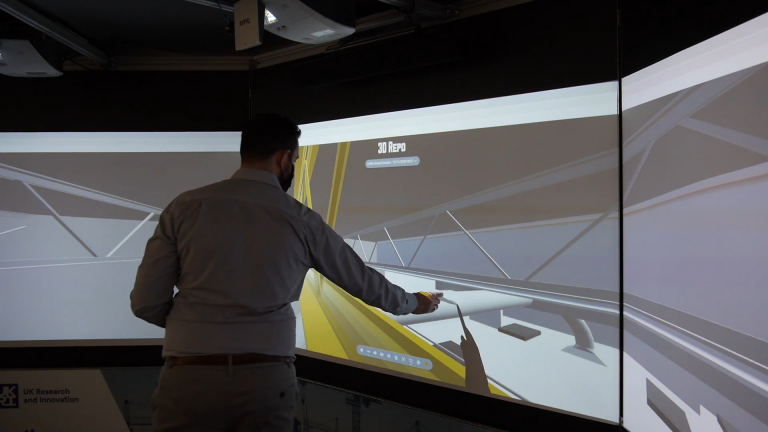AEC Production Control Room Project: update one year on
31 August 2021
In this guest blog, Olly Dawkins, Research Assistant with the UCL Connected Environments Team at the Bartlett Centre for Advanced Spatial Analysis, provides an update on the AEC Production Control Room project which is being implemented at the UCL East construction site.

The AEC Production Control Room is a two-year project, led by Mace, which is being undertaken by a consortium of partners including 3DRepo, eviFile, Mission Room, Imperial College London and UCL. With £1.6 million funding from Innovate UK this project aims to deliver a scalable, repeatable, ‘plug and play’ control room system which demonstrates the prospects and benefits of these systems for more efficient and proactive project management in construction.
In the project’s first year UCL’s Connected Environments team undertook a review of construction control room facilities and developed requirements for the use of sensor technologies and real-time data analytics within construction.
Visualising live construction information in site-based control rooms is expected to improve communication and collaboration between stakeholders, while aggregating this information across sites enables setting, monitoring and analysis of key performance indicators that grant strategic advantages for the management of an entire construction portfolio.
To support early testing and development of the system, the Connected Environments team hosted one of the control rooms at their base in the Bartlett Centre for Advanced Spatial Analysis (CASA). Meanwhile, the Bartlett School of Sustainable Construction have been developing new business models to support wider industry adoption of the production control room concept that align with wider industry initiatives to improve delivery of infrastructure, such as Project 13.
Three site-based control rooms
Key milestones for the project are the deployment of three site-based control rooms on live construction projects, with a fourth to be deployed at Mace headquarters. The first live construction project to join the project in late 2020 was the Renzo Piano-designed development at Paddington Square, a 17-storey retail and office development overlooking Paddington Station.
Once on-site, colleagues at Imperial College London assisted in orchestrating all of the required site data, while a series of dashboards were developed to support weekly construction look-ahead meetings. These meetings provide an agile method for planning and reviewing construction activity.
A key focus here is visualisation and analysis of planned versus actual construction. The teams from UCL have been assisting this activity by contributing to the design, testing and evaluation of these systems.
The project’s second control room has recently been installed in Network Rail’s Manchester offices to support their Project Alpha improvement plan for the North West and Central Regions of their network. A key focus of this project is expected to be the management of the railway’s time dependent windows for track closure that allow for safe maintenance and construction on active railway lines.
The third project is back in London, at 40 Leadenhall Street, Make architects’ 34-storey office development in the City of London. Here the current focus is on the visualisation and analysis of building information modelling data for 4D planning during construction.
Now in its final year, the project is working toward the delivery of the fourth and final control room at Mace headquarters in London. In addition to providing visualisation for the project’s portfolio overview, the space will also serve as an innovation hub within Mace. This is enabling UCL to explore a number of projects using advanced visualisation, robotics, and sensor technologies.
These projects include the monitoring and analysis of crane fleet operation; a collaboration with UCL Computer Science exploring the use of an autonomous robot for proactive monitoring of site conditions; and development of a 3D spatial interface as prototype digital twin for the Mace portfolio.
Together these efforts align the AEC Production Control Room concept with wider industry aspirations for a national digital twin, introduced by the Centre for Digital Built Britain’s Gemini Principles, and the aims of the Governmental Industrial Strategy Construction Sector Deal which seeks to improve the performance of UK construction through more efficient and proactive project management across all scales of operation.
Click here to read more about the AEC Project Control Room
 Close
Close

